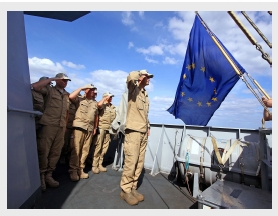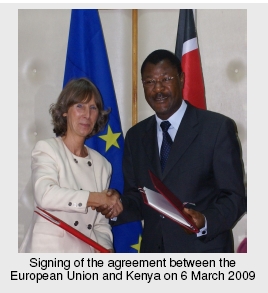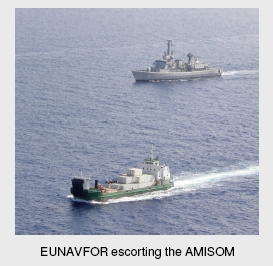(EUNAVFOR Somalia — Operation ATALANTA)
On 8 December 2009, the Council of the EU decided to extend the mandate of the military operation to help deter, prevent and repress acts of piracy and armed robbery off the coast of Somalia for another year (until 12 December 2010). The European Union has been conducting this operation since December 2008.
 |
This military operation, named EUNAVFOR Somalia — Operation ATALANTA, was launched in support of Resolutions 1814, 1816, 1838, 1846 which were adopted in 2008 and 1897 adopted in 2009 by the United Nations Security Council.
Its aim is to contribute to:
- the protection of vessels of the World Food Programme (WFP) delivering food aid to displaced persons in Somalia;
- the protection of vulnerable vessels sailing in the Gulf of Aden and off the Somali coast and the deterrence, prevention and repression of acts of piracy and armed robbery off the Somali coast.
This operation — the European Union’s first ever naval operation — is being conducted in the framework of the Common Security and Defence Policy (CSDP) of the EU.
Mandate
Operation ATALANTA’s mission is to:
- provide protection for vessels chartered by the WFP;
- provide protection for merchant vessels;
- employ the necessary measures, including the use of force, to deter, prevent and intervene in order to bring to an end acts of piracy and armed robbery which may be committed in the areas where they are present.
Operational parameters
The Political and Security Committee (PSC) exercises the political control and strategic direction of the EU military operation, under the responsibility of the Council of the European Union. For its part, the European Union Military Committee (EUMC) monitors the correct execution of the operation conducted under the responsibility of the Operation Commander.
Rear Admiral Peter Hudson (UK) commands the operation from the Operational Headquarters (OHQ) at Northwood, United Kingdom. There he plans and conducts the operation as directed by the authorities of the European Union.
Rear Admiral Jan Thörnqvist (SE) commands the European naval force from the Force Headquarters (FHQ) on board of HMS Carlskrona, a frigate present in the theatre.
 |
More than twenty vessels and aircraft takes part in EUNAVFOR, i.e. more than 1 800 military personnel. At the present time, the following EU member states are making a permanent operational contribution to the operation: the Netherlands, Spain, Germany, France, Greece, Italy, Sweden, Belgium, Luxembourg and Portugal. Also, a number of other EU military personnel supplement the team at the Northwood OHQ. Since August 2009, Norway is the first non-EU country to participate in ATALANTA. Croatia, Montenegro and Ukraine also participate in the operation.
The joint funding of the operation amounts to EUR 8,3 millions for the first year. This budget, which is shared between the EU member states and is established on the basis of their GDP, mainly covers the running costs of the OHQ and the FHQ. The common costs for supplying the force are borne by the contributing countries and established according to their involvement in the operation, with each country continuing to bear the cost of the resources it provides (notably deployment costs, logistic support).
EU Transfer Agreements
The military personnel involved in the operation can arrest, detain and transfer persons who are suspected of having committed or who have committed acts of piracy or armed robbery in the areas where they are present. They can seize the vessels of the pirates or the vessels captured following an act of piracy or an armed robbery and which are in the hands of the pirates, as well as the goods on board. The suspects can be prosecuted, as appropriate thus far, by an EU member state or by Kenya under the agreement signed with the EU on 6 March 2009 giving the Kenyan authorities the right to prosecute. An exchange of letters concluded on 30 October 2009 between the EU and the Republic of Seychelles allows the transfer of suspected pirates and armed robbers apprehended by ATALANTA in the operation area. This arrangement constitutes an important new contribution to the counter-piracy efforts. This agreement is based on the same conditions and framework than the Kenyan agreement. Similar arrangements with other countries are being developed or explored.
The European naval force operates in a zone comprising the south of the Red Sea, the Gulf of Aden and part of the Indian Ocean, including the Seychelles, which represents an area comparable to that of the Mediterranean. Several other naval forces also operate in this zone. The EUNAVFOR operation is in permanent liaison with these forces (US-led coalition CTF-151, NATO, Russian, Indian, Japanese, Malaysian and Chinese vessels).
 |
Each merchant vessel wishing to transit through the Gulf of Aden or off the coast of Somalia is advised to register in advance on the website of the Maritime Security Center-Horn of Africa (www.mschoa.eu), which was set up at the beginning of the operation to facilitate the coordination of maritime traffic.
This initiative, which was welcomed by the whole community of ship owners and merchant navies, makes it possible for vessels that observe EUNAVFOR recommendations to get the best degree of security available and to receive – in some cases – close military protection, and thus reduce the risk of attacks or capture.
The comprehensive European Union approach
 |
EUNAVFOR-ATALANTA is part of the global action conducted by the EU in the Horn of Africa to deal with the Somali crisis, which has political, security and humanitarian aspects.
The EU supports the Djibouti process for peace and reconciliation in Somalia, facilitated by the UN. In this context, the EU welcomed the election of President Sheik Sharif Sheik Ahmed on 30 January 2009. The EU is multiplying its efforts to support the peace process and has called on all parties in Somalia to ease the suffering of the population and to seize this opportunity to work towards the restoration of security, stability and development in Somalia. The government also has the task of delivering a new constitution, to be adopted by referendum, and of setting up democratically elected institutions by the end of the transition period in August 2011.
The EU and its Member states support the African Union’s military mission to Somalia (AMISOM) financially, in terms of planning and capacity building, in order to increase, in particular, the efficiency of the Somali police force and to combat any abuse and serious violation of human rights.
EUNAVFOR has also provided the necessary resources to protect ships aimed at sustaining AMISOM or deploying AMISOM reinforcements.
 |
The Joint Strategy Paper for Somalia for 2008–2013 provides an allocation of EUR 215,8 million under the EC’s 10th European Development Fund (EDF). It covers three main sectors of cooperation: governance, education and rural development. The issue of the security of maritime routes is also included in the European Commission’s 2009–2011 indicative programme.
On 22 and 23 April 2009, was held in Brussels the International Conference in support of the Somali Security Institutions and the AMISOM, organised by the UN, the EU and the African Union. Almost USD 213 million were pledged to help the Somali Transitional Federal Government bring about peace and stability.
On 7 April 2010, the Council of the EU launched the EU military mission to contribute to training of Somali security forces (EUTM Somalia)1. The training will start in the beginning of May 2010. This mission will take place in Uganda where Somali forces are already being trained, which will also facilitate the coordination of the EU action with the AMISOM.
Source:
European Union

 von
von